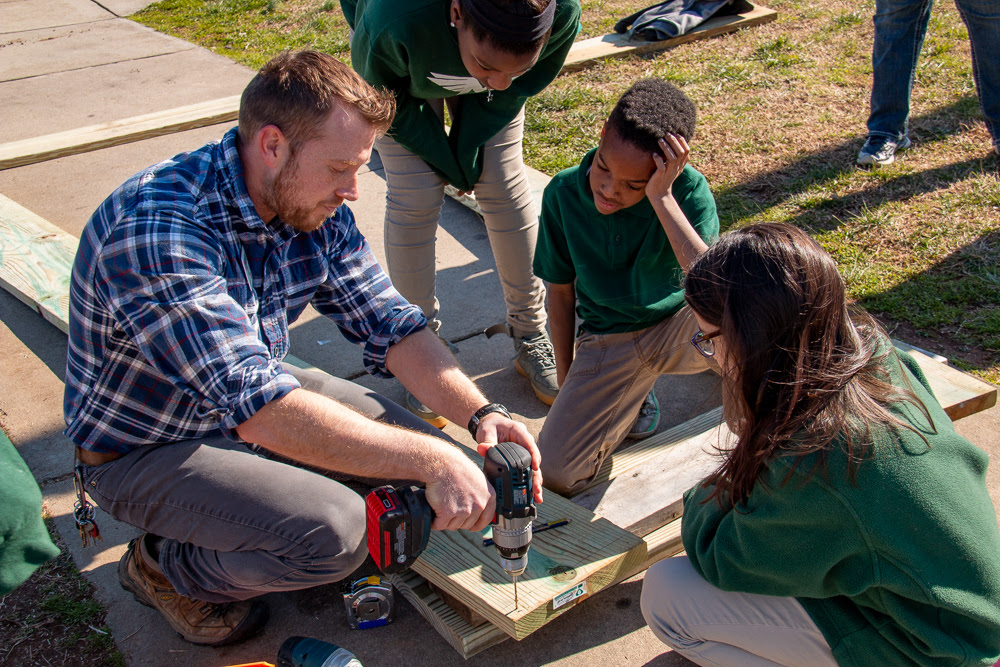Career Connection: NC Cooperative Extension Agent

Introducing our 2024-25 FRESH From the Garden series. In each newsletter, Doug will share an interview with someone whose career connects to school gardens; whether directly or indirectly, we recognize that school gardens can inspire students in ways that few other “classrooms” can. The opportunity to explore, measure, read, problem solve, work as a team, communicate, discover and theorize–all while being in an outdoor environment–can spark an untapped interest. We’ll kick off this series with a person we’ve come to know and admire for their outstanding work as an Extension Agent for N.C. Cooperative Extension–Mr. Aaron Moore. Here’s his story.
Name: Aaron Moore
Organization: N.C. Cooperative Extension – Union County Center
Position: Agriculture Extension Agent – Commercial Horticulture
Q. What do you do?
A. It’s hard to understand my career without knowing what Extension is, so let’s start there.. N.C. Cooperative Extension is a strategic partnership between our two land-grant universities NC State and NC A&T State, as well as state and local governments, industry and community partners. My job as an Extension Agent is to take research-based information and share that information with the local community through practical learning experiences. Education is the bulk of what I do. However, the education that I provide probably looks much different from what you might think. Most of the time I’m on farms working one-on-one with growers, but I also teach classes and hold field days for hands-on learning and demonstrations. I also work with the greater community by collaborating with other organizations to facilitate agriculture education for schools, 4-H clubs, professional organizations and the general public.
Q. What was your path to your current career?
A. I’ve been in my career field for 18 years and have held a variety of positions along the way. My formal education includes two associate degrees, (Ornamental and Landscape Technology and Turfgrass Management), a bachelor’s degree in Agricultural Education, a graduate certificate in Horticultural Science, and I am currently finishing a master’s degree in Horticultural Science at North Carolina State University.
My career path really started with an entry level position at a North Carolina Agricultural Research Station in 2007. In that position I learned that agricultural research and education was the area where I wanted to build my career. In 2013, I went to work for the Horticulture Extension Specialist at NC A&T State University where I worked on research trials and demonstrations in fruit, vegetable and specialty crop research. There I gained more knowledge about Extension and the opportunities available within that organization. Many of the positions I was interested in pursuing required higher degrees so I went back to school and into the position I’m in today.
As an Extension Agent I’ve had the opportunity to pursue my master’s degree and continue to improve my knowledge and skills in my job. Extension really values continued education for employees. Without the support of the universities I’ve worked for and mentors I’ve worked under it would have been a challenge to get where I am in my career. I’ve always believed education and training was a wise investment in my future and at times a necessity to move forward in my career.
Q. How important are math, science and communication skills to finding success in your field?
A. Agriculture Extension relies heavily on science, math and communication to fulfill our mission of sharing research based information. As an Agriculture Extension Agent, I use science and math to calculate fertilizer rates, determine irrigation run times and identify insects, mites, diseases and plants, but that is just the tip of the iceberg. There’s much more of my everyday job that requires math, biology and chemistry. Communication skills are equally important. Having good relationships in the community is vital to success as an agent. If I can’t effectively communicate with the community, they will probably stop considering me a trusted resource.
Q. What is most fulfilling about your career?
A. Extension allows me to work in a field I love and help others in my community. It’s very fulfilling to have that sense of purpose and excitement in my everyday job.
Q. Prior to your career, did you have experience working/learning in a school garden, home garden or community garden?
A. Yes, I grew up working in my parents’ and grandparents’ gardens. Some of my fondest memories as a kid were in those gardens digging potatoes, picking tomatoes or spending time with my family in those spaces. Looking back, it’s probably those gardens where my love for horticulture began and why I pursued the line of work I’m in today.
Q. How does your career intersect with school gardens?
A. Currently I provide resources like seed or plants, develop hands-on learning projects and give technical assistance for a few school gardens in the county. My goal is to partner with colleagues in my office to expand that model and reach more schools and teachers. I think school gardens are great learning spaces and I enjoy helping in any way I can.
Aaron reflects, “My career path wasn’t planned out when I started working. Everything doesn’t have to be figured out at the beginning but always be prepared to invest in yourself to get where you want to go.”
Wouldn’t it be great if we would create an educational environment that helped inspire our students to one day choose a career that they love as much as Aaron does? The school garden just might be that place. If you happen to live and/or work in Union County, I hope you take advantage of Aaron’s expertise and Extension’s resource-rich offerings.
- Categories: